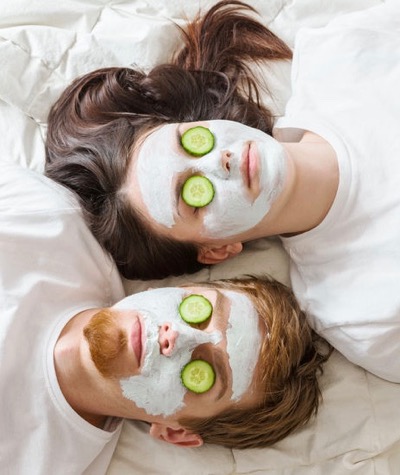- Home
- Essential Oils for Skin Care
- Face Masks for Acne
As an affiliate for Bookshop, Amazon, and other programs, I may earn a small commission for products purchased through links. This doesn't affect the price you pay. Privacy policy and disclosures.
Search this site:
DIY Face Masks for Acne Using Essential Oils
Are face masks for acne helpful? It depends on what's in them.
Dermatologists often recommend masks containing acne treatments such as benzoyl peroxide, salicylic acid, or sulfur. Some dermatologists recommend charcoal or clay as a less drying option.
Let's look at some essential oil acne face masks.

Here are basic tips for using any face mask:
- Before applying a mask, wash your skin with warm water and pat dry.
- Don't use a mask too often (once a week max) or you may make the acne worse.
- Always spot test a mask before using it on a large area to make sure you don't have an adverse reaction.
DIY Face Masks for Acne
If you want to make a homemade acne mask, tea tree essential oil is your best friend.
Clay Acne Face Mask
"Clay masks are great for acne prone oily skin as the clay draws out the impurities from deep in the pores," according to dermatologist Dr. Michele Green in a Bustle article. A clay mask will help active breakouts heal faster.
Here's a mask recipe from Healing With Aromatherapy:
- 1.5 teaspoons green clay
- 1/3 teaspoon grapeseed oil
- 3 drops tea tree essential oil
- Aromatherapy hydrosol or distilled water
- Combine first three ingredients.
- Add enough water or hydrosol to make a creamy paste.
- Apply the paste to your face, leave on for 15 minutes, and then rinse off.
Acne and Oily Skin Face Mask
- 2 teaspoons cosmetic clay of choice
- 2 drops petitgrain or lemongrass essential oil\
- 1 drop tea tree essential oil
- about 3 teaspoons strong herbal tea or low-fat yogurt
- Whisk together clay and essential oils in a small bowl.
- Stir in enough tea or yogurt to create a paste of desired consistency.
- Apply mask to clean, damp face. (Throw out any leftover portion.)
- Leave mixture on for 15 to 20 minutes.
Wash face with warm water. Apply toner and moisturizer.
Source: The Big Book Of Essential Oil Recipes For Beauty
Tea Tree Oil Masks
An acne face mask can be as simple as combining tea tree essential oil with one ingredient. For example, make a mask by blending 1 to 2 drops tea tree with one of the following:
- 1/4 of an avocado, mashed
- 1 teaspoon aloe vera gel
- 1/4 cup plain yogurt
- 1 teaspoon rhassoul clay, plus enough distilled water to make a thin paste
Tea tree oil is the active ingredient, so you can combine it with any carrier that's safe to put on your face.
Honey Mask
Some sources recommend raw honey as a face mask for acne. Apply about 1 teaspoon of honey to your face (add a drop or two of tea tree or lavender essential oil, if desired). Rinse off after 15 to 30 minutes.
Does honey really work? It's questionable but worth a try, especially if you add tea tree oil.
Learn more about using essential oils for acne.
Kaolin Clay Mask
Here's a mask without tea tree:
- 4 teaspoons finely ground almond meal
- 2 teaspoons kaolin clay
- 1 teaspoon honey
- 1 drop juniper essential oil
- 1 drop roman chamomile essential oil
- 1 drop lavender essential oil
- distilled or filtered water
- In a small bowl, combine the almond meal, clay, and essential oils.
- Stir in just enough water to make a soft paste.
- Spread the mask over your face, avoiding the eyes.
- Rest for 10 to 15 minutes and then wash off the mask with lukewarm water.
Source: The Complete Aromatherapy & Essential Oils Handbook for Everyday Wellness
Buy essential oils: Aromatics International or Rocky Mountain Essential Oils.
Photo Credit: varunalight / 123RF Stock Photo



